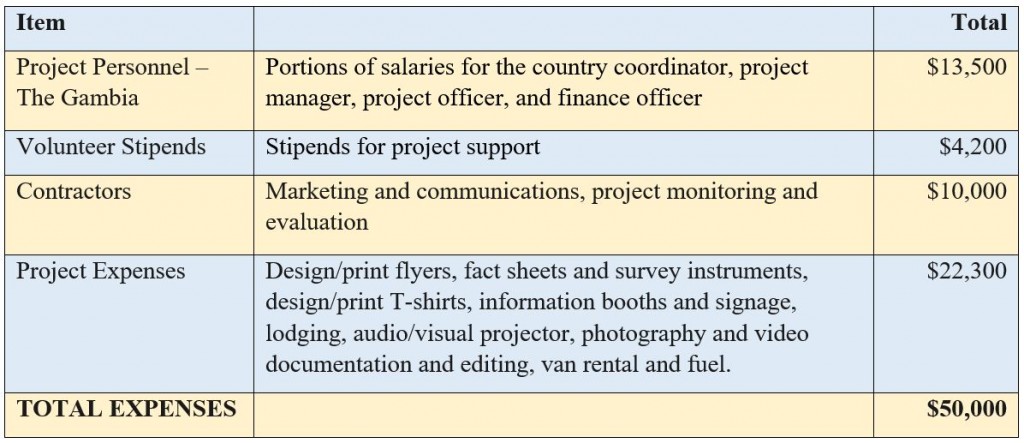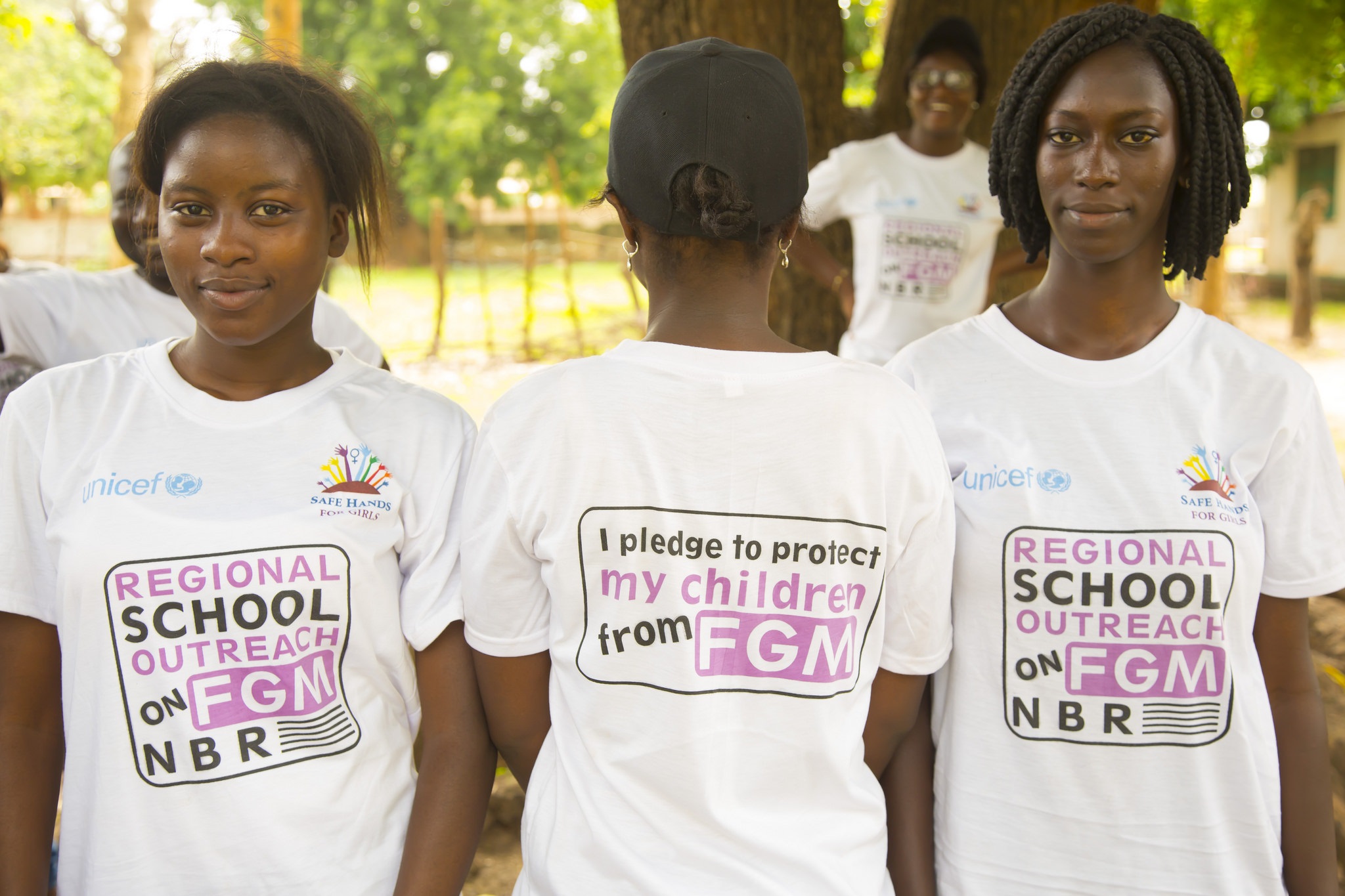
Mission
The mission of Safe Hands for Girls is to help end the practice of Female Genital Mutilation, also known as Female Genital Cutting, as well as other forms of violence against girls and women and abuses of women’s rights, through programs and activities that address the many factors that perpetuate these conditions.
Life Challenges of the Women Served
The terms Female Genital Cutting, Female Genital Mutilation and Female Circumcision refer to at least four types of procedures that, using the definition of the World Health Organization and the United Nations, include “any partial or total removal of the external female genitalia or any other injury of the female genital organs for nonmedical reasons.” According to the U.S. Department of Health and Human Services’ Office on Women’s Health, the United States also uses this definition and the term FGC in its efforts to end the practice.
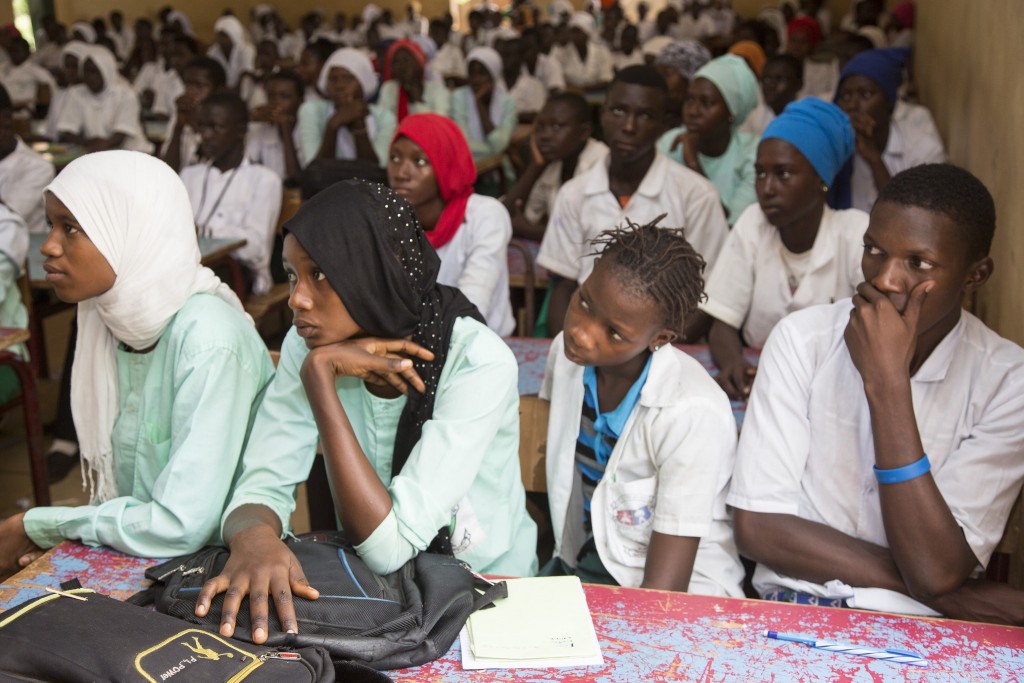 Dining for Women refers to this practice as Female Genital Cutting or FGC, rather than Female Genital Mutilation. DFW has adopted this language not to sanitize or in any way reduce the effects these procedures have on women, but because other organizations have found the term promotes dialogue on this critical issue and removes the perception of a value judgment on families who have FGC as part of their culture.
Dining for Women refers to this practice as Female Genital Cutting or FGC, rather than Female Genital Mutilation. DFW has adopted this language not to sanitize or in any way reduce the effects these procedures have on women, but because other organizations have found the term promotes dialogue on this critical issue and removes the perception of a value judgment on families who have FGC as part of their culture.
The Gambia’s population is 1.8 million (2013 census) and slightly over 50 percent female. More than 76 percent of women and girls have undergone FGC and face a range of physical and mental health consequences as a result. FGC is a cultural practice and not a religious practice. Groups belonging to different religions practice it, though some religious leaders do sanction it. FGC is an extreme violation of women’s rights, which denies women and girls the most fundamental rights over their own bodies. It is a practice that is performed, almost exclusively, against a girl’s will. It is delivered by force, with crude tools and without anesthesia and without follow up medical care. FGC can cause severe pain, bleeding, problems urinating, cysts, infections, infertility, complications in childbirth, and even death. The psychological effects of FGC can include post-traumatic stress and depression. FGC is a fundamental violation of the rights of girls and is a manifestation of gender discrimination.
Currently, as many as 200 million women and girls worldwide live with the consequences of FGC and every day, 6,000 more girls are affected. In The Gambia, nearly one million women and girls are affected and half a million girls are at risk. Although, over the last several years, the government of The Gambia has engaged in many initiatives on women’s rights, violence against women and girls remains a pressing issue. FGC, early marriage and nutritional taboos (such as the avoidance of certain foods during pregnancy and lactation) result in sharply reduced life-expectations for females as well 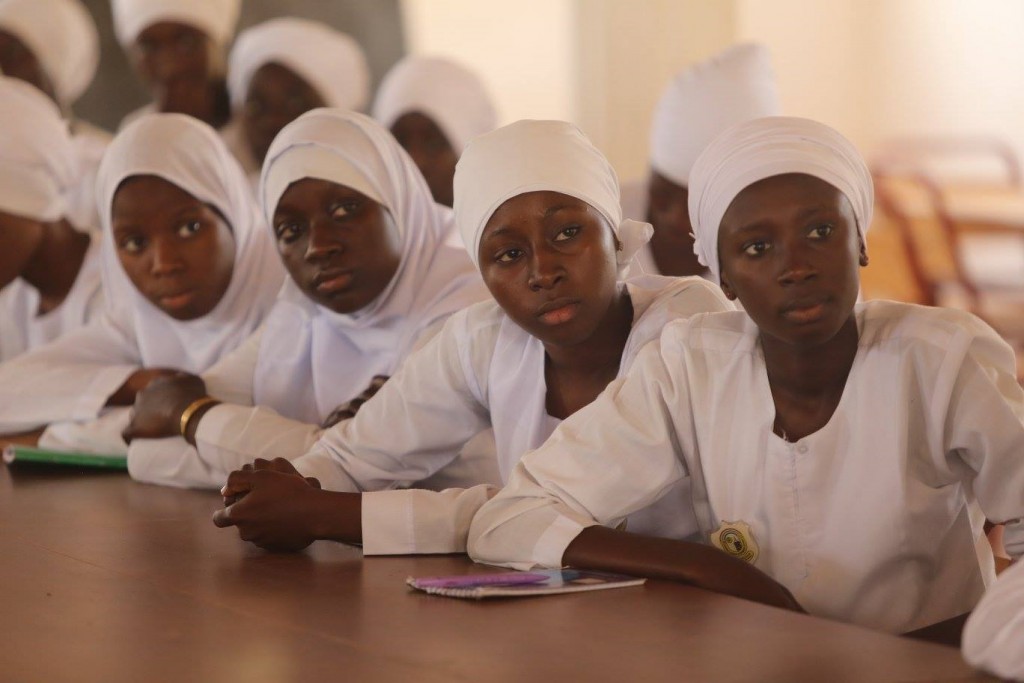 as devastating health problems. In The Gambia, 46 percent of the population is under age 15 and there are over 120 new births daily. By age 14, 56 percent of girls have the procedure, and the trend of practicing FGC on infant girls is increasing. It is enabled by a fabric of deeply-rooted cultural norms, tradition, and the powerful voices of parents and community elders, including the women who perform FGC. (FGC is often a major source of income for community members who act as practitioners.)
as devastating health problems. In The Gambia, 46 percent of the population is under age 15 and there are over 120 new births daily. By age 14, 56 percent of girls have the procedure, and the trend of practicing FGC on infant girls is increasing. It is enabled by a fabric of deeply-rooted cultural norms, tradition, and the powerful voices of parents and community elders, including the women who perform FGC. (FGC is often a major source of income for community members who act as practitioners.)
FGC is enforced by community expectations around marriageability. By having a daughter cut, the family ensures that she will be a desirable marriage prospect. FGC not only risks girls’ health, the social consequences that uncut girls face are equally severe. A girl who is not cut is often ostracized by her community.
The Project
In The Gambia, Safe Hands for Girls’ projects focus on educating young people, and on advocacy and awareness building for the general population. The Ending FGM in The Gambia project’s main goal is to help end FGC by changing the perceptions and beliefs about the practice among the Gambian population through education, awareness and advocacy aimed at 1) young people as future parents; 2) religious leaders and ethnic community elders; and 3) parents, as well as the population at large.
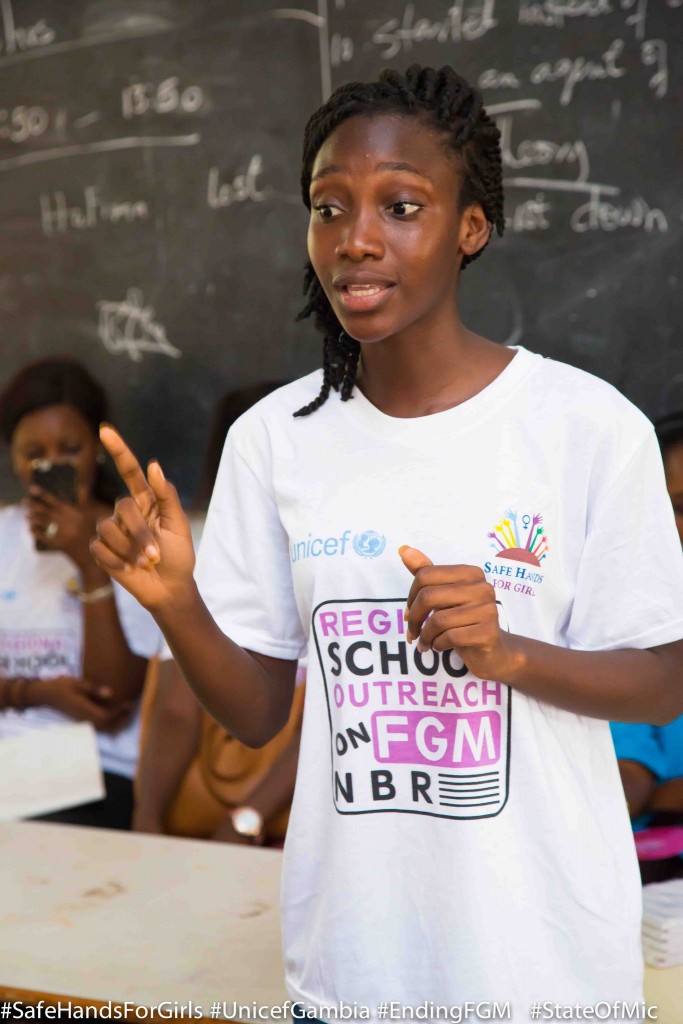 Although the President of The Gambia banned FGC in December 2015, and The Women’s Act of 2010 was amended to make FGC illegal in 2016, the laws are not yet widely promulgated and understood across the country. Safe Hands for Girls educates the population on the law and its penalties by community and school outreach. The goal is to establish the educational program in an average of five schools in each region of The Gambia.
Although the President of The Gambia banned FGC in December 2015, and The Women’s Act of 2010 was amended to make FGC illegal in 2016, the laws are not yet widely promulgated and understood across the country. Safe Hands for Girls educates the population on the law and its penalties by community and school outreach. The goal is to establish the educational program in an average of five schools in each region of The Gambia.
The project funded by DFW includes School Outreach, Youth Peer Leadership, and Information Booth programs, and will help expand the project into an additional five regions of The Gambia. For the School Outreach Program, Safe Hands works with the Gambian Ministry of Basic and Secondary Education, which selects the schools they will visit in each region and coordinates with the schools’ administration. Girls account for 75-80 percent of students. At the end of the school program, Safe Hands and school staff identify students who will be invited to take part in the Youth Peer Leadership program, and again 75-80 percent are girls. Safe Hands recruits, trains and manages the volunteers who will help implement both the School Outreach and the Information Booth Campaign programs. Every community is different, so Safe Hands for Girls relies on guidance by women leaders in the communities, who are their advisors.
This project is expected to reach 1,000 girl students in their classrooms with information that can change their knowledge and perceptions about FGC and their intentions to act concerning the practice. It will train and support up to 150 girls as Youth Peer Leaders working in their schools and communities as ongoing advocates. It will also reach at least 2,000 women and girls (and 1,000 men and boys) in their communities with information about FGC that can change their opinions and beliefs.
Sustainable Development Goals
![]()
![]()
Questions for Discussion
- How is this project addressing the deeply-rooted cultural tradition of FGC?
- Besides being a violation of a girls’ human rights, how does FGC affect their future achievements and opportunities?
- Safe Hands for Girls’ goal is to end FGC by 2030. How do you think this project will help achieve that?
How the Grant Will be Used
DFW’s grant of $50,000 for one year will help fund project personnel, volunteer stipends, marketing and communications, monitoring and evaluation, and project expenses.
Why We Love This Project/Organization
We love this project because the issue of FGC continues to be a challenge in certain communities. This project has a charismatic founder with a compelling personal story who has achieved a lot in a short time, including working to make FGC illegal in The Gambia. The project has good collaborators and is working on changing deep-rooted cultural beliefs.
Evidence of Success
Between 2013 and 2016, Safe Hands for Girls’ achievements include the following:
- Advocated successfully in 2014-2015 for legislation making FGC illegal in The Gambia. In 2016, child marriage, which is closely associated with FGC, was outlawed.
- In early 2014, launched a petition signed by over 221,000 people, calling on the U.S. government to determine the prevalence of FGC in the U.S. That June, Safe Hands for Girls gave testimony before members of the House of Representatives. In January 2016, the CDC published the research showing that 503,000 women and girls in the U.S. are survivors or at risk of FGM.
- Organized the first National Islamic Conference on FGC in The Gambia in January 2016. At the end of the conference, 16 of the 23 members of the Supreme Islamic Council pledged support to end FGM.
- In December 2016, co-hosted the first U.S. Summit to End FGC with Equality Now in Washington, D.C., with the goals of 1) advancing the U.S. commitment to end the practice and 2) bringing together activists, civil society and government leaders to share best practices and to launch the ongoing U.S. Network to End FGM. Over 200 participants from 25 countries attended.
Enabled education for 1,500 students at five basic and secondary schools about FGC and its health effects and consequences, to prepare a new generation to abandon FGC for themselves and their children.
Voices of the Girls
“My face was covered with a piece of cloth from my forehead to my neck. I could not see anything until I realized that my body was on the ground, both my legs held tight and spread out wide. Even before I was cut, I had started screaming. I felt something taken away from me, then I was shut down because tears and screams would not help the pain I felt subside. I ended up losing my voice. The pain I felt was just unbearable. My mum came into the room and started crying and I could not hold my tears because I was going through so much pain to the extent that I thought I was going to die. After some weeks, I was healed but I could not have access to health care, all they applied was tomato paste.”
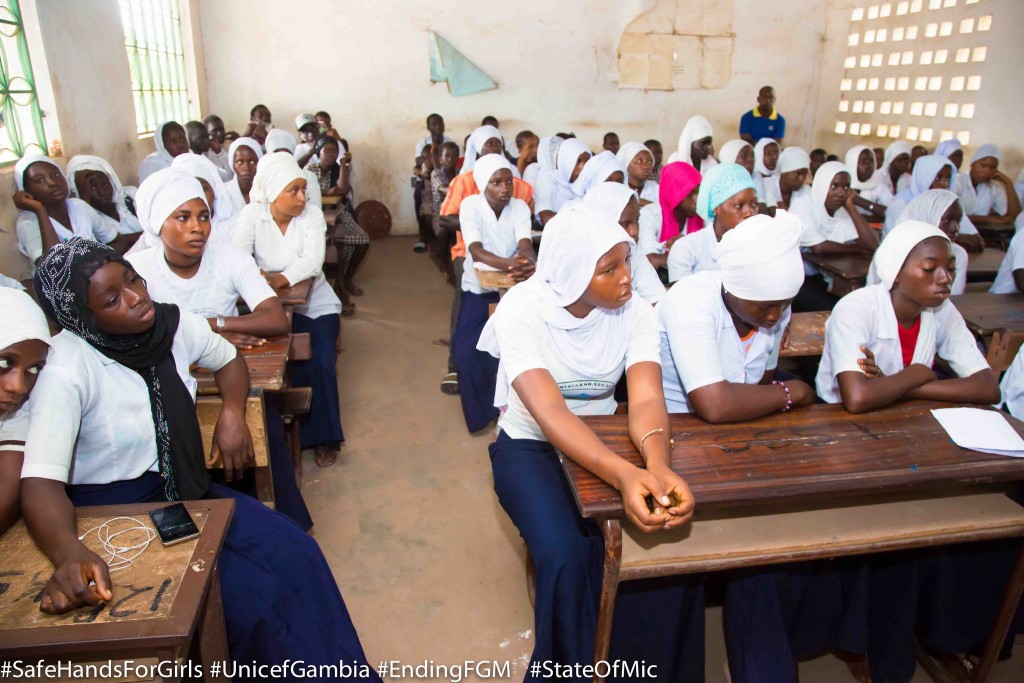 — Isatou J., 12th grade student now a Gambian Youth Leader
— Isatou J., 12th grade student now a Gambian Youth Leader
This year, Isatou attended the Safe Hands for Girls’ FGM workshop at her school. She says, “it was a quite an interesting and outstanding training because it brought together so many people from different cultures and circumstances, ranging from Islamic scholars, students, activists, legal practitioners and survivors. With these, it made my understanding so easy and comprehensive.”
Today Isatou describes herself as a child rights activist and a feminist and says FGC is a violation of human rights, of women’s rights and is familiar with both national law and international policy on this issue. She trained as one of Safe Hands’ peer educators and leads a peer group at her school.
About the Organization
Safe Hands for Girls was established in Atlanta in 2013 by Jaha Dukureh, a young Gambian woman who had relocated to the United States, to provide emotional and practical support to refugee and immigrant women – FGC survivors – from The Gambia and other African countries.
As a survivor of FGC and early marriage, Jaha started Safe Hands out of her living room after realizing that there were so many girls and women like her in her community and that a survivor-led movement and support system was overdue.
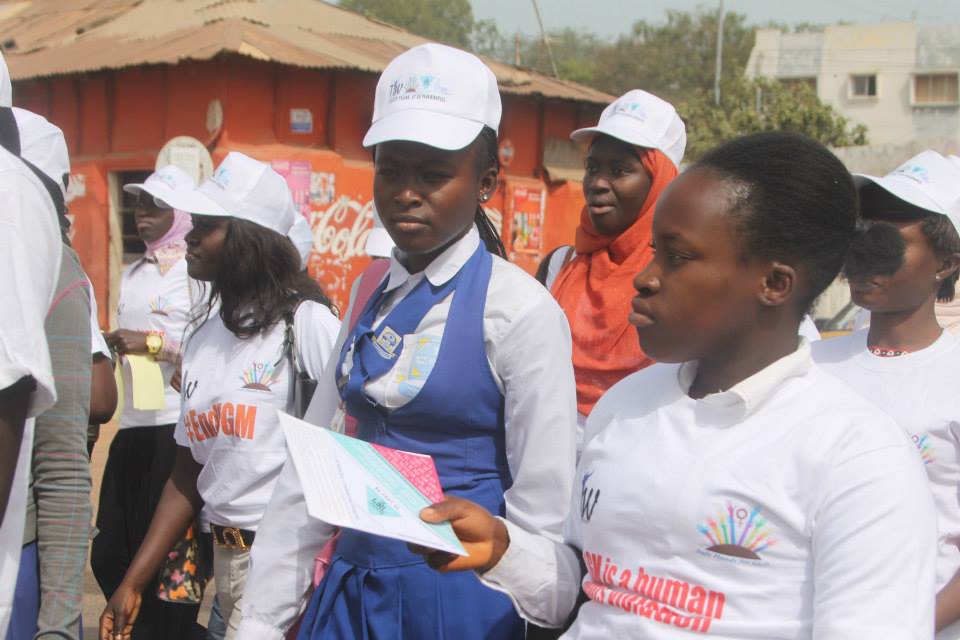 Safe Hands for Girls quickly expanded its outreach to include adolescents and young women in their schools and to train physicians on sensitive care for FGC survivors, reaching over 100 women and girls in the first year.
Safe Hands for Girls quickly expanded its outreach to include adolescents and young women in their schools and to train physicians on sensitive care for FGC survivors, reaching over 100 women and girls in the first year.
In 2014, Safe Hands for Girls was incorporated in Georgia as a nonprofit organization with IRS 501(c)(3) status. In 2015 the organization received a certificate of incorporation as a charitable organization in The Gambia. In 2016 Jaha Dukureh was named to the Time magazine “Most Influential” list, a recognition which has brought significant new attention to FGC and Safe Hands for Girls. She was the spokesperson for The Guardian’s Global Campaign to End FGC from 2014 until 2016.
A 2017 documentary film, “Jaha’s Promise,” chronicles the life and struggles of Jaha Dukureh as she advocates to end FGC. An 18-minute extended clip of the film is currently available online here. The film has been screened at several film festivals and was the “runaway winner” of the Audience Award at the Dublin Documentary Festival in September 2017.
Where They Work
The Gambia is located in Western Africa, bordering the North Atlantic Ocean and Senegal. The population of The Gambia is almost equally divided between urban and rural areas. According to the UN, the GDP per capita as of 2014 is $441.30, and according to a 2015 UNICEF report, the school enrollment rate in urban areas is 97 percent, but as low as 63 percent in some rural areas. The school completion rate for girls is 74 percent.
There are many tribes in The Gambia, but the main ones are Mandinka, Wolof, Fula and Jola, each having its own language and traditions. The Gambia is a 95 percent Muslim country but one of the most religiously tolerant countries around the world.
The Gambia’s youthful age structure – almost 60 percent of the population is under the age of 25 – is likely to persist because the country’s total fertility rate remains strong at nearly four children per woman. The overall literacy rate is around 55 percent, and is significantly lower for women than for men. At least 70 percent of the populace are farmers who are reliant on rain-fed agriculture and cannot afford improved seeds and fertilizers. Crop failures caused by droughts between 2011 and 2013 have increased poverty, food shortages, and malnutrition.
The maternal mortality rate is 706 deaths/100,000 live births (2015 est.), and the infant mortality rate is 62 deaths/1,000 live births. About 25 percent (2006 est.) of children ages 5-14 are involved in child labor.
A Closer Look at Female Genital Cutting
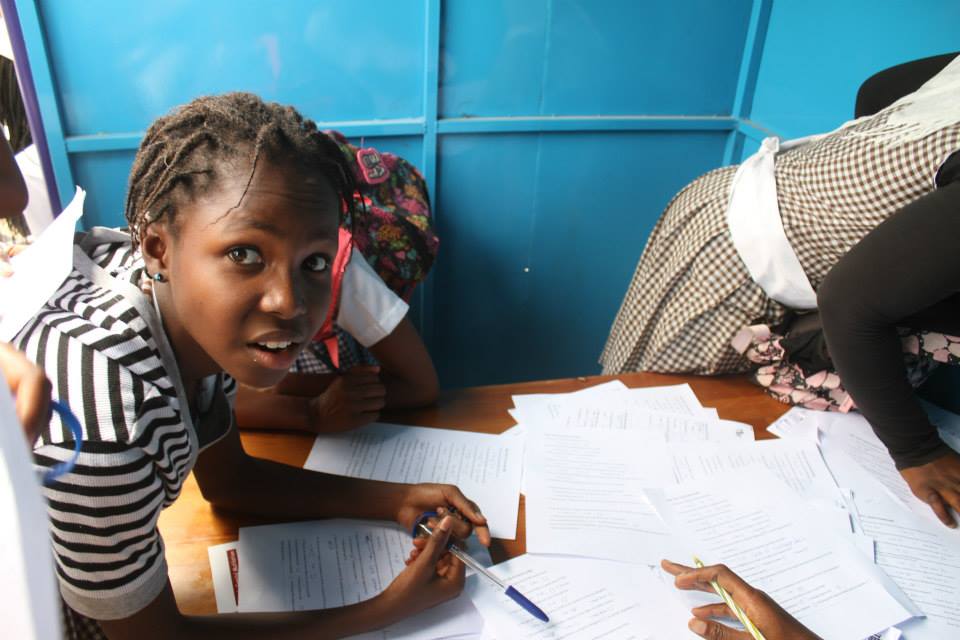 Female Genital Cutting (FGC), also known as Female Genital Mutilation (FGM), comprises all procedures that involve partial or total removal of the external female genitalia, or other injury to the female genital organs for non-medical reasons. The procedure has been performed on as many as 200 million girls and women alive today. It is most common in the western, eastern, and north-eastern regions of Africa and in some countries in the Middle East and Asia, as well as among migrants from these areas. FGC is therefore a global concern. (A Centers for Disease Control and Prevention issued-report estimated that in the United States, more than 503,000 women and girls are affected or at risk.) Procedures are usually carried out on young girls sometime between infancy and adolescence, with the majority of girls cut before the age of five.
Female Genital Cutting (FGC), also known as Female Genital Mutilation (FGM), comprises all procedures that involve partial or total removal of the external female genitalia, or other injury to the female genital organs for non-medical reasons. The procedure has been performed on as many as 200 million girls and women alive today. It is most common in the western, eastern, and north-eastern regions of Africa and in some countries in the Middle East and Asia, as well as among migrants from these areas. FGC is therefore a global concern. (A Centers for Disease Control and Prevention issued-report estimated that in the United States, more than 503,000 women and girls are affected or at risk.) Procedures are usually carried out on young girls sometime between infancy and adolescence, with the majority of girls cut before the age of five.
FGC has no health benefits, and can cause severe physical and mental harm.
The practice continues due to cultural norms. People practice it because their mothers, grandmothers and great-grandmothers have practiced FGC for centuries. Although no religious scripts prescribe the practice, practitioners often believe the practice has religious support. Where FGC is a social convention, the social pressure to conform to what others do and have traditionally done are strong motivators. In some communities, FGC is almost universally performed and unquestioned. It is often considered a necessary part of raising a girl, and a way to prepare her for marriage. In many communities, a girl is seen as being ready for marriage once she has undergone 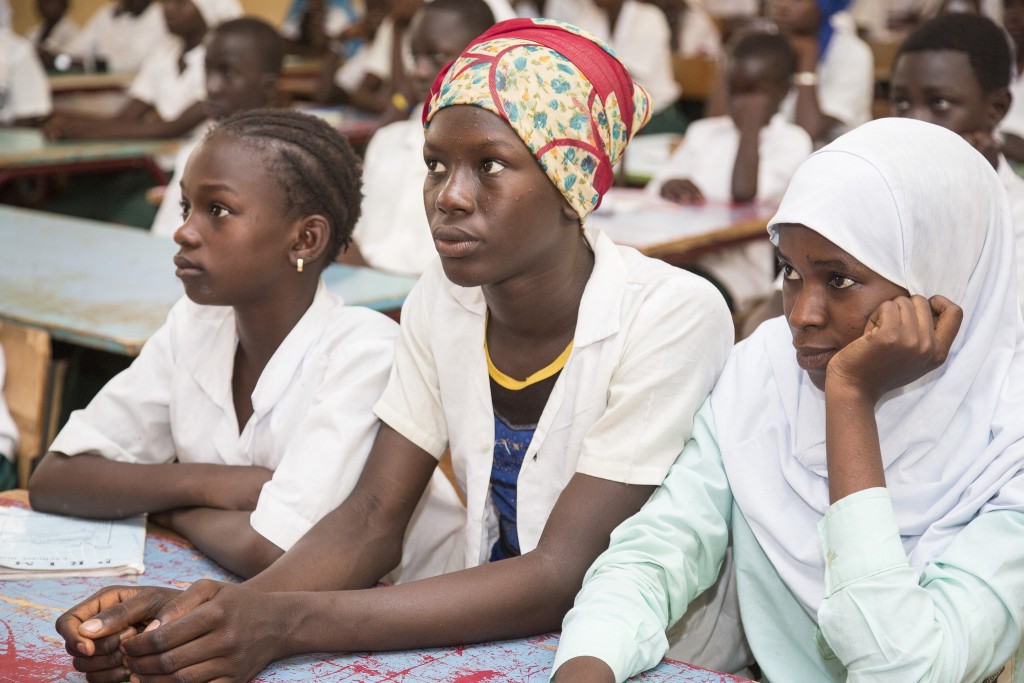 FGC, which is why there is a link between FGC and child marriage.
FGC, which is why there is a link between FGC and child marriage.
FGC is associated with cultural ideals of femininity and modesty, which include the idea that girls are clean and beautiful after removal of body parts that are considered unclean. It is also often motivated by beliefs about what is considered acceptable sexual behavior. It aims to ensure premarital virginity and marital fidelity.
FGC is recognized internationally as a violation of the human rights of girls and women. It reflects deep-rooted inequality between the sexes, and constitutes an extreme form of discrimination against women. It is nearly always carried out on minors and is a violation of the rights of children.
Source Materials

